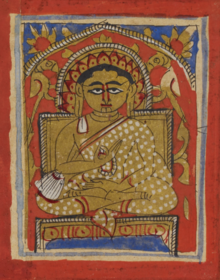In Jainism, the term Ganadhara is used to refer the chief disciple of a Tirthankara. In samavasarana, the Tīrthankara sat on a throne without touching it (about two inches above it).[1] Around, the Tīrthankara sits the Ganadharas.[2] According to Digambara tradition, only a disciple of exceptional brilliance and accomplishment (riddhi) is able to fully assimilate, without doubt, delusion, or misapprehension, the anekanta teachings of a Tirthankara.[3] The presence of such a disciple is mandatory in the samavasarana before Tirthankara delivers his sermons. Ganadhara interpret and mediate to other people the divine sound (divyadhwani) which the Jains claim emanates from Tirthankara's body when he preaches.[4]
| Indrabhuti Gautam Ganadhara | |
|---|---|
 |

The monastic sangha of Jainism is divided into a number of orders or troupes called ganas, each headed by a ganadhara.[5][6]
In 20th century, statues depicting Tīrthankaras and Ganadharas were unearthed in Mayurbhanj district of Odisha.[7]
List of the Ganadhara of 24 Tīrthankara
edit| No. | Tīrthankara | Count | Famous Ganadhara |
|---|---|---|---|
| 1 | Rishabhanatha (Adinatha) | 84 | Vrishabha Sen, Kachha, Maha Kachha, Nami, Vinami[8] |
| 23 | Parshvanatha | 8 | Kesi, Subhadatta, Aryaghoṣa, Vashishtha, Brahmachari, Soma, Sridhara, Virabhadra and Yasas |
| 24 | Mahavira | 11[9] | Indrabhuti Gautama, Agnibhuti, Vayubhuti, Sudharmaswami, Vyakta, Mandikata Mauryaputra, Akampita, Acalabharata, Metarya and Prabhasa |
Ganadhara Vrisabha Sen
editVrishabha Sen was the Ganadhara of Tīrthankara Rishabhanatha. According to Jain legends, after the nirvana of Rishabhanatha, Bharata was in grief. Ganadhara Vrisabha Sen saw him and spoke to him:
"Surely, this is not an occasion for grief, for the Lord has gone to the everlasting Abode of the Immortals, which you and I even are also going to reach very soon![10]
After this, Bharata recollected himself, touched the feet of Ganadhara Vrisabha Sen and left for his kingdom.
References
edit- ^ Jain 2008, p. 95.
- ^ Jain 2008, p. 96.
- ^ Jain 2012, p. xi.
- ^ Dundas 2002, p. 37.
- ^ The Early Centuries of Jainism
- ^ Jain Agama Literature
- ^ Nagendra-Natha Vasu, The archaeological survey of Mayurabhanja, p. xivi
- ^ Jain 2008, p. 126.
- ^ Natubhai Shah 2004, p. 38.
- ^ Champat Rai Jain (1929). "XI. Ganadhara Vrisabha Sen". Risabha Deva - The Founder of Jainism. K. Mitra, Indian Press, Allahabad. p. 189.
Sources
edit- Jain, Vijay K. (2012), Acharya Amritchandra's Purushartha Siddhyupaya, Vikalp Printers, ISBN 9788190363945,
Non-copyright
- Jain, Champat Rai (2008), Risabha Deva (Second ed.), India: Bhagwan Rishabhdeo Granth Mala, ISBN 9788177720228
- Dundas, Paul (2002) [1992], The Jains (Second ed.), Routledge, ISBN 0-415-26605-X
- Shah, Natubhai (2004) [First published in 1998], Jainism: The World of Conquerors, vol. I, Motilal Banarsidass, ISBN 978-81-208-1938-2